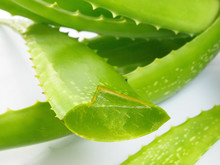-
From Andrew- Is Aloe Vera fabulous for the skin? Aloe VeraWell Andrew, that’s a good question, even so the answer will depend on which team you ask. There are many naturopathic healers who are very enthusiastic about its use to take care of many conditions including sunburns, psoriasis, osteoarthritis, high cholesterol levels, to some cure for scars. It can be within lots of skin products which might be widely accessible, usually as lotions and sunblocks. The ancient Egyptians were using Aloe Vera since 4,000 BC where that it was referred to as the “plant of immortality”. Medical doctors have a new opinion about the matter. If you're must them about ways to use Aloe, the response would most likely be, “there isn’t enough scientific evidence to exhibit it’s an acceptable strategy for anything”. Given the massive volume of products available and anecdotal evidence seemingly supporting its use, I’m one health care professional that finds it problematical to argue Aloe doesn’t have all, but let’s go through the evidence.
 There are two substances the Aloe Vera plant produces which might be used as medicines- gel and latex. The gel would be the clear, jelly-like stuff within the center from the plant’s leaves. Surrounding the gel, just below the plant’s skin, is really a yellow material called latex. There are some medicines which might be constructed from the full crushed leaf that includes both gel and latex, but generally latex is taken orally plus the gel is mostly used topically. Although some claim taking gel orally has benefits. The Aloe gel itself contains glycoproteins and polysaccahrides. Glycoproteins are recognized to assist in healing by reducing inflammation and stopping pain. Polysaccahrides benefit skin growth and repair. It’s also considered that these substances help stimulate the defense mechanisms. It doesn’t come off as too farfetched then to imagine many purposes of different diseases and types of conditions. Many people keep making bold claims caused by these factors within the plant. The scientific research, however, show many contradictory results, prompting most governing medical bodies to classify Aloe’s use as “needing more evidence” before they may endorse it. The National Center for Complementary and Alternative Medicine (NCCAM) lists only two recognized important things about Aloe. The first is to be a laxative. That being said, the FDA accustomed to allow the usage of oral Aloe latex being a laxative, but suspended it in 2002 because animal studies showed high doses could cause cancer. This is often a real concern given it takes increasing doses with time to get the desired affects.
There are two substances the Aloe Vera plant produces which might be used as medicines- gel and latex. The gel would be the clear, jelly-like stuff within the center from the plant’s leaves. Surrounding the gel, just below the plant’s skin, is really a yellow material called latex. There are some medicines which might be constructed from the full crushed leaf that includes both gel and latex, but generally latex is taken orally plus the gel is mostly used topically. Although some claim taking gel orally has benefits. The Aloe gel itself contains glycoproteins and polysaccahrides. Glycoproteins are recognized to assist in healing by reducing inflammation and stopping pain. Polysaccahrides benefit skin growth and repair. It’s also considered that these substances help stimulate the defense mechanisms. It doesn’t come off as too farfetched then to imagine many purposes of different diseases and types of conditions. Many people keep making bold claims caused by these factors within the plant. The scientific research, however, show many contradictory results, prompting most governing medical bodies to classify Aloe’s use as “needing more evidence” before they may endorse it. The National Center for Complementary and Alternative Medicine (NCCAM) lists only two recognized important things about Aloe. The first is to be a laxative. That being said, the FDA accustomed to allow the usage of oral Aloe latex being a laxative, but suspended it in 2002 because animal studies showed high doses could cause cancer. This is often a real concern given it takes increasing doses with time to get the desired affects. votre commentaire
votre commentaire


